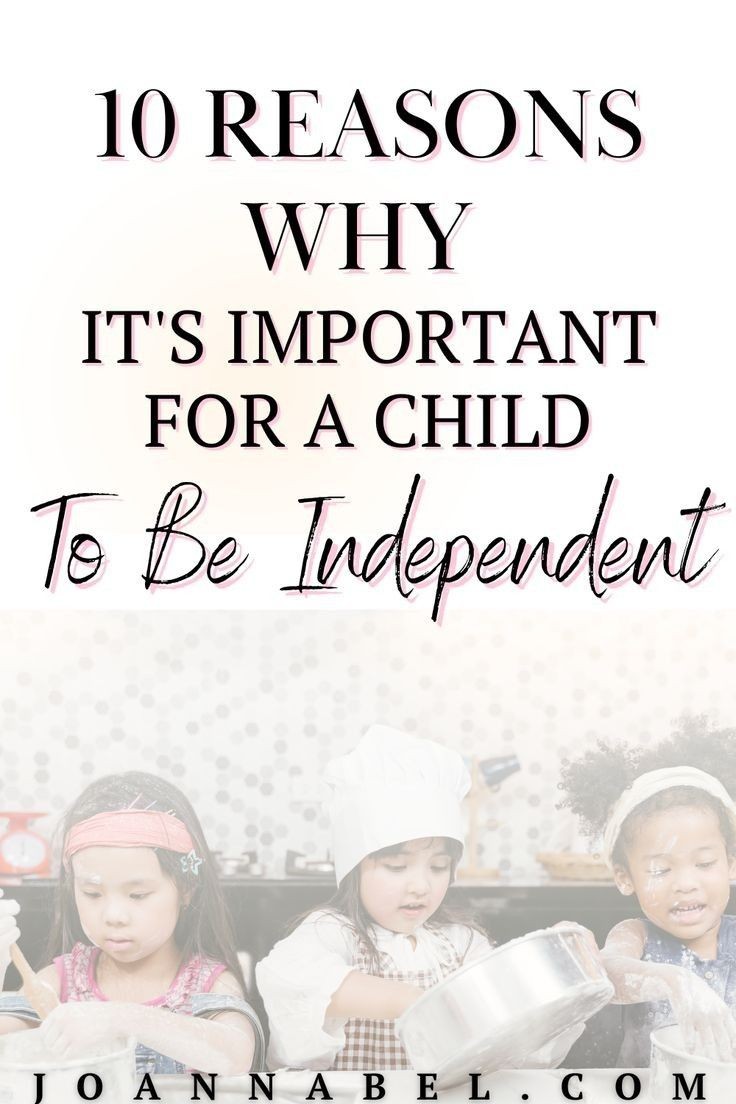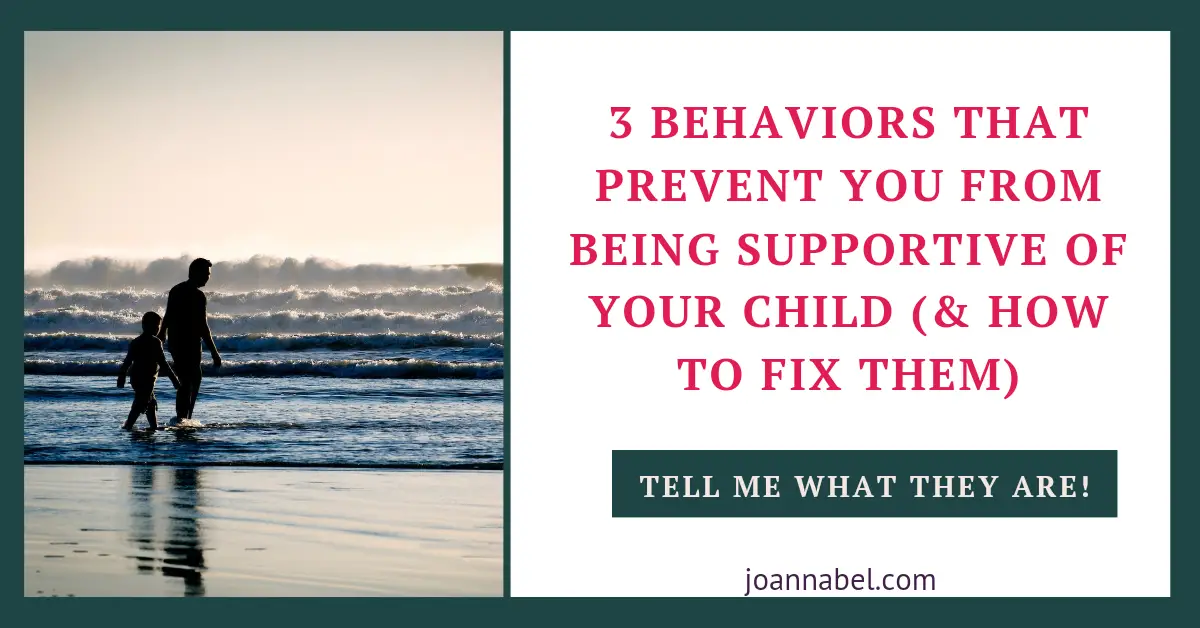If you’re eager to uncover the critical reasons why it’s important that your child to become more independent, then this is the place to be.

Why It Is Important To Promote Child Independence
It’s important to promote child independence because by practicing independence they will grow into:
- authentic,
- more autonomous people who are confident in their abilities,
- competent individuals who can make independent choices, live authentic lives, and face life’s challenges, as well as overcome them by relying on their strengths and capabilities.
This is why in this post we’ll be talking about the 10 most important reasons why you should support your child to become more independent as they grow and mature.
Note: Although I am a Clinical Social Worker, engaging with this website does not establish a professional social worker-client relationship. The information provided here is for general purposes only and should not be considered professional advice. While we strive to ensure accuracy and reliability, this content is not a substitute for professional guidance. For specific concerns, issues, or situations, it is essential to consult a qualified professional and present your situation. Read the full Disclaimer here.
WHY IT’S IMPORTANT TO ENCOURAGE CHILD INDEPENDENCE

When we talk about child independence, we’re not talking about them being fully independent, because this isn’t possible nor it is good for them. If kids are in a position where they’re being either too dependent or too independent, this is potentially harmful to them – it definitely isn’t in their best interest, and it means that as a parent you need to increase responsiveness.
Now if this is your case, this doesn’t mean things are final and nothing can be done, because you can become more responsive and you can turn things around, as this is mostly about your perspective and a little about your practice.
I talk about responsive parenting in another blog post that you can check out, but, essentially, when there is emotionally warm and responsive parenting, then children are certain they’re loved, cherished, and respected enough as persons, as human beings and their needs are met accordingly.
To be responsive in this situation (encouraging independence) you need to understand where kids are coming from – what they inherently need. And (maybe most importantly) – what your beliefs concerning child independence are because they are driving your actions and parental practices.
You’re probably wondering if kids can be too independent. The answer is YES.
To find just the right balance I recommend that you encourage them to become more and more independent as they mature and start as soon as possible. And at the same time – remain a person who is responsible to provide guidance and emotional support along the way.
Once we cleared all of that out, we can jump right onto our list of 10 reasons why it is important to promote your child’s independence.
Let’s begin.
#1 PROMOTING INDEPENDENCE BUILDS CONFIDENCE IN KIDS THROUGH ACTION AND REPEATING
When kids see they’re capable of learning a new skill, doing things by themselves, or accomplishing things in their way they become more and more self-reliant.
And then they will be more courageous to go through this process the next time. And then again and again.
This way they’ll get a chance to start to see obstacles in life more like challenges and less like burdens. Which makes them more self-driven and self-motivated and life.
As well as less dependent on the approval or consistent (often excessive) support of others as they mature.
I know you know from your experience how important this is later in life. We all have or know people in our lives who are not independent enough or are struggling with this. And sometimes, honestly, this is too exhausting for us, I know that it is for me.
Again, we’re not aiming at children becoming too independent and detached from others.
And I’m not suggesting that they don’t rely on support from others in life, because this can be essential.
But there’s a big difference between nurturing too dependent and enmeshed relationships and cultivating relationships where there is balanced closeness and everyone can live freely and be healthily connected to their closest others. And nurture mutual respect.
You may want to read also:
#2 PROMOTING INDEPENDENCE IN A CHILD BUILDS TOLERANCE FOR FRUSTRATION
Encouraging child’s independence supports them in increasing their tolerance for frustration.
For example, by doing things by themselves they’re not just sitting and waiting to utilize things someone else finished for them.
It’s all right to seek convenience in life.
But we need to find the right balance so we don’t end up stuck, incapable of making any progress. Because we’re looking for ways to be comfortable all day long.
It takes time to do things, like finish a project, and it takes time for things to work out.
And when they start to do things by themselves, they begin to get used to this process.
And this makes them less anxious and less frustrated later when they need to do it again. Considering they’re now aware they need to nurture patience, put in the effort, and wait for the process to end.
This is great for them for later in life when they reach adulthood.
On top of this, previous experience decreases the anxiety that comes out of uncertainty about how things will work out. As well as how things will look in the end, or at what point will they end.
And increases their confidence in their abilities to perform well in whatever thing they’re doing.
I know that you want to protect them from unpleasant things.
And that it’s hard for you to watch them struggle.
But they ‘need to struggle’ with certain things so they can learn how to overcome them. As well as learn to deal with unpleasant emotions that are part of the process.
At the same time, being too protective sends a message that you suspect their competence. And I’m sure you don’t mean that.
This is why you need to show them that you do believe in their capacity, by encouraging them to become more and more independent as they grow.
#3 BECOMING MORE AND MORE INDEPENDENT GIVES THE CHILD A VOICE
This is an indirect outcome, or better said benefit.
When they’re let to practice independence this grounds them and strengthens their individuality so they get more in touch with their sense of self.
On top of this, when they take on certain responsibilities and make an effort to do things by themselves, they become aware of their power and agency. As well as how they can turn around or affect certain things.
Moreover, when we’re responsible for things in life we’re more likely to fight for our right to have a saying on these things. Because inside of us there’s an unsettling feeling of unrest if someone wants to decide for us.
If we’re not using our voice in life concerning things that matter and affect us, this happens because we believe (we were led to believe) that it’s not on us to do so.
And those who have contributed to us being unaware/in denial of our power or rights, have (consciously or unconsciously) protected the status quo.
Even if they aren’t doing it intentionally, they are putting in the effort for things to remain the same, whether they know it or not.

Now, if you respect children and see them as competent individuals, which then results in encouraging them to become more independent, you will be acknowledging their voice.
Especially if you support them to exercise participation and make independent choices. And we can debate whether there is such a thing as an independent choice.
If you ask me there is, because making an independent choice doesn’t have to mean that we must be under no influence of others whatsoever.
But the point is, that we need to create conditions where they can exercise to make their choices.
Sometimes, they will choose between 2 things that are heading towards the same outcome. But you need them to do it in a certain way for their own good and they won’t influence the outcome of things.
And that’s alright because you still included them and they were given a chance to speak.
Other times, their voice will matter more and they’ll influence the final decision.
And this will give them a sense of control (that they really need) over how things that are affecting their life will go.
You might want to check out also:
#4 BY EXERCISING INDEPENDENCE, CHILDREN GAIN LIFE SKILLS
Encouraging children’s independence brings many life skills with it. Considering they’re learning how to do certain things around the house, managing their own stuff, their room and corners, managing money, cooking, cleaning, personal hygiene, maybe gardening, using different tools, tech, and so on.
When you teach/show them how to handle different things, and have the patience to wait on them to figure them out and pick up on them, you’re giving them a chance to obtain a new skill.
Plus, they will continue to use the skill throughout the course of their lives.
Fast forward – as young people or adults, they will need a number of skills for ‘normal’ functioning in their everyday lives.
Just think of those skills you as an adult are now utilizing with ease and are taking for granted, but have taken you some time to acquire.
Like preparing a healthy cooked meal for yourself regularly, or keeping your house somewhat tidy most of the time. Or doing things simultaneously.
If you don’t provide enough opportunities to build different skills, they’ll have a hard time catching up when a time to be fully independent comes knocking at their door.
And they won’t feel confident, because maybe they’re not skilled and not ready to take on responsibilities because they’re not used to independence.
It is faster to do things yourself, but when they learn to do it once, your job is done. And you won’t be waiting the next time or soon.
LIVE Q&A And Consultations with Jovana (WISHLIST)
Want a chance to get included in live weekly calls with me and get access to my expert insights, advice, recommendations, and guidance for your unique situation?
Consider signing up if you are aiming for:
- achieving tremendous child-parent relationships with the least effort possible as you learn what to focus your attention to
- attuning to healthy child development practices without losing yourself in the process and ignoring your human needs, rights, and aspirations for your life
- understanding and responding to your and your child’s needs better and carefully easing the tension between the two
- having your most pressing questions and concerns addressed and ongoing support
- getting skilled in honoring the child’s best interest in each life situation with the help of a few key rules and principles (child wellbeing, independence, autonomy, participation, and equality)
- experiencing a supportive and cooperative relationship with the other parent or a co-parent even in high-conflict circumstances
Address your doubts, concerns, and challenges, but also reflect on your situation through the experiences of others in this small and supportive community.
You’ll unlock monthly access for 60% off of my current hourly rate!
#5 AS CHILDREN GROW TO BE MORE INDEPENDENT THIS STRENGTHENS THEIR RESPONSIBILITY
Responsibility is an interesting phenomenon – we can be having an urge to avoid it and grab it at the same time. We can’t live without it. Yet it’s hard when everything is on us constantly.
When we’re not taking personal or social responsibility we don’t feel good, it doesn’t feel right. While at the same time we may be stuck repeating a pattern of ”chronic” irresponsibility. Even though we don’t want to go through life that way but we just can’t have a breakthrough.
This suggests that people can be saying (and really mean it) that they want one thing (the one that is desirable) and do the other. Even the opposite.

You may think that it’s easier for people who avoid taking responsibility in your life. Yet, in most cases, that isn’t the truth, because for those people this is like a vicious cycle. Their relationships and their functioning decline more and more over time, but they’re unable to break the cycle.
Handling responsibility also takes practice. So without the opportunity for doing so, we might end up being conflicted about it as adults.
That’s because we have an intrinsic urge to be responsible, and yet can we feel uncertain and unconfident to perform.
And this is an unflattering position, considering it can obstruct our functioning together with our relationships.
To avoid showing how ‘unskilled’ we are, we may continue to engage in unhealthy habits. Or continue to make bad decisions for our lives. As well as avoid all the unpleasant emotions that come with all of that, etc.
So to prevent this ‘messy’ outcome, it’s better to practice responsibility from an early age.
Naturally, doing it age-sensitively and carefully, going step by step. A good way is to enable participation in decision-making.
This never means children have unilateral responsibility, control, and power. What it does mean is that we share all of this with them.
This makes them more and more skilled and capable and it’s the right thing to do –> it’s in their best interest and it’s their right.
If you need a resource to help you support your child in becoming more responsible read my post that guides you through this step by step.
Here is the link:
#6 ENCOURAGING INDEPENDENCE TOUGHENS KIDS TO DEAL WITH FEELING LIKE AN IMPOSTER
Feeling like imposters or intruders in (different segments of) our lives comes from being denied the chance to claim our competence, and being persuaded we’re less competent than we are.
Or from constant questioning of our competence, and being forced to prove it over and over again (this is what happens to women for instance).
All of these examples are forms of control, where someone else is trying to take over or retain dominance.
Everyone can feel like an imposter. As children all/most of us were denied the right to be included in decision-making about matters that affected our lives (directly and indirectly). If not by our parents then by other members or systems in society.

But feeling like an imposter is disproportionately affecting women (in comparison to men). That’s because their competence continues to be questioned or denied.
And they’re being forced to comply with criteria that ‘suit’ (white) men and are not applicable to them. But also to comply with criteria that are not objective criteria for competence. Or success, etc.
So women are twice hit. Once through their childhood experience where they are held back on basis of being a child (and plus as being a female), while when they get to adulthood are being hit again through the social constructs and norms designed to fit men, but not them.
And this can affect their performance and their ambition.
But what’s the worst of all, even when they accomplish everything they want with their hard work, they might still feel like they didn’t deserve this. Or simply question their capability every step of the way.
And the situation gets more and more complicated once the race is in play as well, and so on.
To ensure children have more humane and inclusive treatments and experiences:
1. start with questioning your beliefs about children and females (even if you are a woman because we’re being instructed to transfer biases and double standards to other women),
2. focus on helping children to continue to build that independence as they grow, on enabling them to make choices from an early age, to practice consent and decision-making, and don’t deny their power and agency.
Research has shown children are competent individuals who can form their opinions and be included in decisions (to the extent they want and can) unless proven differently.
And they’re not to prove their worthiness, capabilities, and competence.
Considering society isn’t developed yet to be fond of children when you encourage their independence by creating conditions for them to participate, they will have more strength to resist the urge to quit that’s induced by feeling like imposters.
They’ll inevitably feel it at least in some segments of life, such as, for example, citizens’ participation in the political life of their community. For example, voting, suggesting initiatives, protesting, and so on.
If you found the information on the blog helpful & inspirational and you feel like giving back, you can do it by clicking the donate button after entering amount you’re comfortable with. I’ll use it to create and deliver more useful content and resources like this. Thanks for your precious contribution!

#7 BY SUPPORTING CHILDREN’S INDEPENDENCE, YOU’RE SUPPORTING BUILDING A SKILL OF DECISION-MAKING
The previous subject naturally leans on to the next, and that’s being skilled at decision-making. This might look like an everyday thing that everyone is naturally talented for, or born with – no matter how you’d put it.
Unfortunately, that isn’t true.
Many people simply can’t catch a break when it comes to decision-making.
And this is because they’re not skilled at it, and more often than not they’re not mature enough for their age. And all because they’re struggling with independence.
You’ll find them including everyone around them they can reach in the decision-making process, even repeatedly creating conflicts through this process. Just so they can, for instance, somehow avoid dealing with the unpleasant thing of deciding or facing the consequences of a decision.
The need behind this behavior can be that they’re trying to please everyone so that everyone continues to accept them or love them after their decision.
And of course, instead of pleasing everyone, they end up with bigger problems than they started with because it’s not possible to please everyone. And it’s not necessary.

On the other hand, what is possible, is making a decision and experience everyone affected by this to be at peace with it because they can understand that was your decision to make.
What I’m saying here is that if they’d built that skill early on, they wouldn’t get into that unbearable situation. (Considering that to them it can become pretty unbearable, almost like agony if they don’t pull others into the process.)
Lack of skill doesn’t have to be the only reason behind avoiding making decisions, but building skills is a good solution regardless.
Therefore, it’s important that you support children to practice decision-making and become more and more skilled.
Because if they don’t, they might end up living disharmonic lives, some may experience a variety of blockages that will obstruct their everyday functioning, they will progress too slowly, or corrupt most of their relationships, and even experience unwanted solitude.
This is because at one point others might just give up and distance themselves from them because they keep pulling them into inconvenient/conflicting situations resulting from a lack of decision-making skills and determination.
To learn a little bit more about child participation in decision-making, read my post:
#8 EMPOWERING KIDS IN BECOMING MORE INDEPENDENT BUILDS CHILDREN’S RESILIENCE
Resilience means that we’ve overcome the difficulty we were in that could’ve destroyed us or left us pretty damaged but it didn’t, and we’re now in shape to continue with our lives and even thrive.
So when we peel the layers of this, we can conclude that we need to go through certain things, certain challenges, and even difficulties to build our resilience.
Now, I’m not saying we should be welcoming some natural disasters, or human catastrophes/disasters.
But what I am saying is that we should shift the perspective from disqualifying those that have.
We do this by either feeling sorry for them, overprotecting them, or denying their competence just because they’ve gone through a difficult life situation or conditions.
By shifting the perspective we become more open to the existence of risks in our lives, even for those who live with disabilities. Regardless if these are intellectual or physical disabilities.
Trying to eliminate any kind of risk is harmful and disabling, for both kids who live with disabilities, and for those who do not.
But this principle is immeasurably significant to respect when it comes to children and people with disabilities.
Simply because the more independence they can achieve (or better said defend) the better life they’ll have.
Once we accept the existence of risks as parts of life, that can enable us to make progress and live more freely, we can release the urge to overprotect others.
In this situation, kids.
And sometimes ourselves, at the same time.
How will they deal with risks, and learn to overcome the frustrations or fears, if they don’t face them?
How will they deal with hardships, and even a catastrophe?
Would you want them to lose it? I’m sure you do not.
What they need instead of you being overprotective (and under-protective) is a balance with protection.
This is achieved by letting them gain their independence and autonomy as they grow. Without doing things on their behalf and controlling them extensively.
Going through life experiences and dealing with the consequences of their choices, and actions, or choices and actions of others (the good and the bad), they can integrate those experiences.
They can digest what they need to digest. Learn lessons they need to learn, so they can move on. And eventually grow from it all.
As a result, they can keep making better life decisions once they know themselves and their desires a little better.
As well as reflect on their current characteristics to see whether they serve them.
And if not, to come up with a solution on how they can change and live their best life.
Or simply the life that they want for themselves.
YOU MAY WANT TO READ ALSO:
#9 PROMOTING INDEPENDENCE MOTIVATES CHILDREN TO OVERCOME FEARS
We all, or the majority of us, experience fears. But unfortunately, not all of us have learned to act despite fear, some tend to even get paralyzed by fears, but all in all, end up not confronting them.
Of course, I’m not talking about the situations when running away is the best option because it’s obvious that we can’t win or even survive otherwise.
It’s more about the ‘everyday’ life fears that can come from unknown situations, places, and tasks, for example.
If we don’t learn how to approach this it can become very challenging for us to handle them. Especially in situations of personal or social crises, difficult times, and milestones in life.
When any of us gets in contact with something that’s unknown we may experience fear, which is usual.
But our goal here is that we move forward despite the fear, and not let fear be in control of us, our functioning, and our behavior.

Parents who can’t find balance with the protection of children will usually obstruct children from managing fears. And they do this in various ways.
Some do things on their behalf, some represent many things to children more fearsome than they are.
While others project their fears and are not letting children behave freely, and gain their own experiences. Including those that aren’t very convenient and pleasant (because this is how life is).
And this disables them to learn to differentiate dangerous situations from those that are not so, on the way.
By carefully encouraging their independence, children are learning how to manage many unfamiliar situations, and overcome different setbacks, or obstacles.
As well as handle times when they’re not succeeding that easily, and so much more.
Once you decide to promote independence, you’ll start motivating them to take more initiative in different areas of their life.
That’s incredible because it ensures they go ahead of many others around them, who are accustomed to being told what to do.
And aren’t comfortable with choosing their own way, finding their path, or even going against the norm.
Speaking if promoting independence, you may want to check out my post:
#10 CHILDREN HAVE AN INTRINSIC DESIRE TO BECOME MORE INDEPENDENT
Kids show that they want and need more and more independence at a very early age.
If your child is a toddler then you’ve probably noticed their curiosity. And how they’re interested in the world around them, as well as their burning desire to steer through it in their own way.
You’ve seen their true motivation for gaining more and more independence.
This is an excellent time to focus on supporting them in trying to do things by themselves (of course carefully and within reason). Because in this early period you have a chance to get more skilled with directing them towards more self-reliance that can later stick in life.
Naturally, if they continue to go this route with your help.
Instead of striving for perfection, it’s essential to focus on the fact that they’re learning and trying.
And disregard that they’re doing things even upside down.
Just point them in a good direction and encourage them, but avoid doing things for them.
Except in situations when it’s obvious that they can’t do it because they’re too tired, are not ready, or something similar.
Also, be careful not to overstep, meaning to expect them to be more independent than it’s realistic and in their best interest.
Even though it would be great that we’re the most efficient, that’s not always needed, the best, or safe, especially concerning children.
You need patience because they are motivated and they are willing, it’s just that they’re also sensitive and in need of gentle treatment, sometimes more than other times, which should also be respected.
If you listen carefully, they will show you or tell you what they need.
And if they’re not toddlers anymore, that doesn’t matter you still got a chance to encourage them to become more and more independent.
You’ll find useful also:
HOW TO HELP A CHILD BECOME MORE INDEPENDENT
If you’re curious to know how to help a child become more independent, I want to mention 9 principles you need to follow to conceive that.
- Children need to do things by themselves
- Children need to make choices
- Children need to give consent
- Children need to be supported to say no
- Children need to be let negotiate
- Children should be let make mistakes
- Children should fail
- Children should learn to handle money
- They need to learn to question social conventions.
And if you’d like these principles explained in more detail, you can read my post How To Help A Child Become More Independent – 9 Principles To Follow.
Latest Posts:
- Simple Safety Measures To Protect Your Family
- The Biggest Benefits Of Adopting A Dog For Your Family (5)
- How To Turn Crafting Into Family Fun Time (6 Ideas)
- Creative Ways To Play With Kids Without Technology
- How To Make Gift-Giving More Special For Kids (4 Ideas)
- How To Do A Prenup Online (What To Expect)
FINAL THOUGHTS ON WHY IT’S IMPORTANT TO PROMOTE CHILD INDEPENDENCE
And there you go! I hope these 10 reasons why you should promote your child’s independence were enough for you to start with this practice or continue with it, courageously! Let’s repeat them real quick:
- Builds Confidence
- Builds Tolerance For Frustration
- Gives Them A Voice
- They Gain Life Skills
- Strengthens Responsibility
- Toughens Them To Deal With Feeling Like An Imposter
- They Will Learn The Skill Of Decision-Making
- Builds Their Resilience
- Motivates Them To Overcome Fears
- They Have An Intrinsic Desire To Become More Independent
I hope you found this helpful, and thank you for taking the time to read this post! Before you go, read my post How To Help A Child Become More Independent – 9 Principles To Follow.
See you there!















Leave a Reply